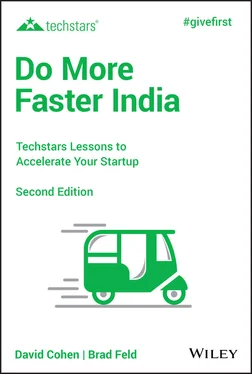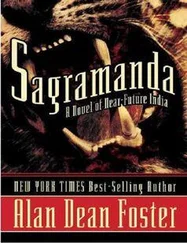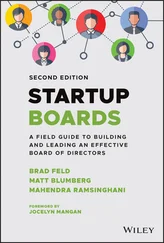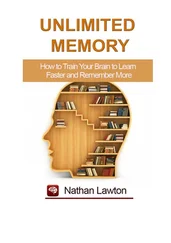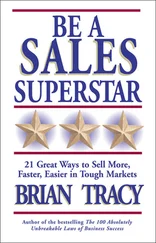Do or do not—there is no try.
Theme One: Idea and Vision
Most people think that the core of a startup is a singular, amazing, world-changing, and earth-shattering idea. It turns out that this is almost always completely wrong. Take it from us, we have had thousands of ideas pitched to us and very few are earth shattering! Here’s a sample of email pitches we have gotten.
Good Morning David!I have an excellent idea that will transform the world and I would like to join your accelerator to make it happen! I can’t tell you what it is but trust me, it will make both of us a lot of money!Dear Mr. Feld,I hope this email finds you doing well. I am a chemical engineer and I have created a novel technology that will make coal-fired power plants more efficient, lowering operating costs, which will translate into lower prices at the fuel pump.Hey David and Brad—Do you know how many cars and trucks there are in the good old US of A? 253 million! And each car and truck can use the technology I’m developing. Each and every one. I have an idea that will probably take a year to finish up and after that, I’ll be your first multibillion-dollar company!
It’s a value of ours to respond to any reasonable email, but we can’t respond to these inquiries based on the information we have. We’re interested in helping entrepreneurs succeed, and without knowing your idea we can’t possibly know if we can help you. Next, we have no interest in helping anyone succeed in a dying industry. It’s like rearranging the deck chairs on the Titanic —the end result is the same regardless of what you do. New coal plant construction has declined nearly 80% globally in the past 10 years, whereas both solar (1,600%) and wind (685%) have increased dramatically in that time frame. Last, pitching the size of the market doesn’t have any bearing on whether your product will be purchased by anybody.
The “earth-shattering” ideas are mostly in the mind of the unreasonably optimistic startup entrepreneur.
Many successful startups started doing something else. At Techstars, many of the companies that have gone through the accelerator are now working on something very different from their original idea. Some of these companies are working in the same general domain but with a completely different application or product area. A surprising number of them are unrecognizable from the description of the business on their original application to Techstars.
When Alex White of Next Big Sound showed up at Techstars, he was immediately confronted with a chorus of “We love you but your idea sucks.” He dropped that original concept a week into the Techstars accelerator, built something amazing, and Next Big Sound ended up being acquired by Pandora several years later. Jeff Powers and Vikas Reddy of Occipital spent the summer working on some sort of image compositing software before landing on the spectacularly successful RedLaser iPhone app that eBay subsequently acquired. Since then, Occipital has launched a string of successful products and is changing the world of augmented and virtual reality. We aren’t even sure we remember what Joe Aigboboh and Jesse Tevelow of J-Squared Media were working on when they showed up at Techstars, but we had a feeling they were awesome, which they then demonstrated by launching a series of successful Facebook applications on the heels of Facebook’s F8 launch. J-Squared Media eventually became PlayQ, which is now a very successful game studio in the Los Angeles area. In each case, we saw that the original idea will often morph as companies grow, and it’s the people that will drive them toward success. The key is to get going and start creating as early as possible.
Startups are about testing theories and quickly pivoting based on feedback and data. This is one of the areas in which an engaged mentor can help you avoid falling down rabbit holes and pursuing data that doesn’t matter. Only through hundreds of small—and sometimes large—adjustments do the seemingly overnight successes emerge.
The idea and the vision are the fundamental building blocks that entrepreneurs need. In the following chapters within this theme, we highlight some of the ways that entrepreneurs come up with ideas and how those ideas develop as a result of getting good feedback and data.
Chapter 3 Trust Me, Your Idea Is Worthless
Tim Ferriss
Tim is the best-selling author of The 4-Hour Workweek, The 4-Hour Chef, The 4-Hour Body, Tools of Titans, and Tribe of Mentors, as well as an entrepreneur and angel investor in companies such as Uber, Facebook, Shopify, Duolingo, Alibaba, and 50-plus others. He has been listed as one of Fast Company’s “Most Innovative Business People” and one of Fortune’s “40 under 40.” Starting in 2008, Tim became a Techstars mentor and is an investor in several Techstars companies, including DailyBurn, Foodzie, and Grove.
Earth-shattering and world-changing ideas are a dime a dozen. In fact, that’s being too generous.
I’ve had hundreds of would-be entrepreneurs contact me with great news: They have the next big thing, but they can’t risk telling me (or anyone else) about it until I sign some form of idea insurance, usually a nondisclosure agreement (NDA). Like every other sensible investor on the planet, I decline the request to sign the NDA, forgoing the idea, often to the shock, awe, and dismay of the stunned entrepreneur.
Why do I avoid this conversation? Because entrepreneurs who behave this way clearly overvalue ideas and, therefore, almost by definition, undervalue execution. Brainstorming is a risk-free, carefree activity. Entrepreneurship in the literal sense of “undertaking” is not. Strap on your seat belt if you’re signing up for a startup. It’s a high-velocity experience.
If you have a brilliant idea, it’s safe to assume that other very smart people are working on the same thing or working on a different approach to solving the same problem. Just look at the number of different travel apps on your iPhone or the number of diet and exercise sites on the Web for an example of this.
Overvaluing the idea is a red flag, particularly in the absence of tangible progress. Sure, with this attitude I miss out on investing in some truly great ideas, but that’s okay with me: I don’t invest in ideas. Neither does Warren Buffett. I’ll lose less money than those who do. I can largely control my downside by investing in good people who, even if they fail this go-round, will learn from mistakes and have other fundable ideas (ideas I’ll likely have access to as an early supporter). I do not have this advantage when investing in ideas.
One popular startup dictum worth remembering is “One can steal ideas, but no one can steal execution or passion.” Put in another light: There is no market for ideas. Think about it for a second: Have you tried selling an idea lately? Where would you go to sell it? Who would buy it? When there is no market, it is usually a very sure sign that there is no value. 1
Almost anyone can (and has!) come up with a great idea, but only a skilled entrepreneur can execute it. Skilled in this case doesn’t mean experienced; it means flexible and action-oriented, someone who recognizes that mistakes can often be corrected, but time lost postponing a decision is lost forever. Ideas, however necessary, are not sufficient. They are just an entry ticket to play the game.
Don’t shelter and protect your startup concept like it’s a nest egg. If it’s truly your only viable idea, you won’t have the creativity to adapt when needed (and it will be needed often) in negotiating or responding to competitors and customers. In this case, it’s better to call it quits before you start.
Focus on where most people balk and delay: exposing it to the real world. If you’re cut out for the ride, this is also where all the rewards and excitement live, right alongside the 800-pound gorillas and cliffside paths. That’s the fun of it.
Читать дальше
